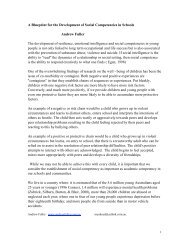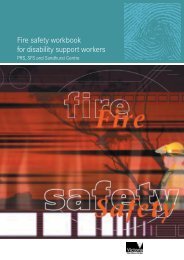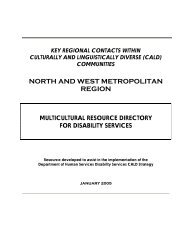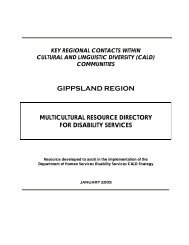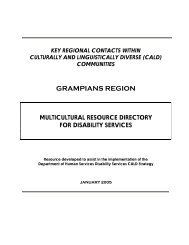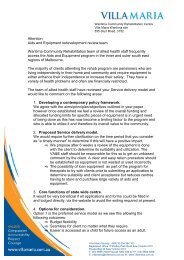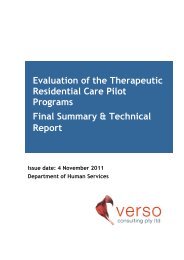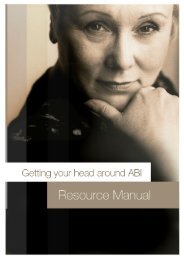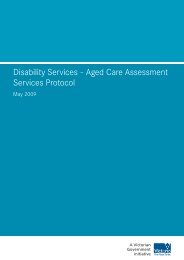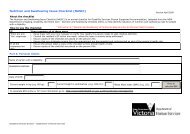Positive Behaviour Support - Department of Human Services - Vic ...
Positive Behaviour Support - Department of Human Services - Vic ...
Positive Behaviour Support - Department of Human Services - Vic ...
Create successful ePaper yourself
Turn your PDF publications into a flip-book with our unique Google optimized e-Paper software.
PowerPoint 64<br />
PowerPoint 65<br />
*<br />
*<br />
<strong>Positive</strong> behaviour support: Getting it right from the start - Facilitators reference manual 45<br />
• Increase the rate <strong>of</strong> providing choices and other communication opportunities to people<br />
with complex communication needs.<br />
• Respond to all attempts at communication made by the person. Be sure to update the<br />
person’s personal communication dictionary regularly.<br />
• Initiate and expand on any social or communicative behaviour made by the person,<br />
this will help the person learn new skills over time.<br />
Describe the expressive language <strong>of</strong> the person you are supporting.<br />
Describe the receptive language <strong>of</strong> the person you are supporting.<br />
Describe any form <strong>of</strong> AAC system your client uses or relies on.<br />
Communication development<br />
Pre-requisites for intentional communication<br />
From the time we are born we are developing the skills or pre-requisites for intentional<br />
communication. Initially our communication is unintentional and consists <strong>of</strong> crying when we<br />
are uncomfortable or hungry and our parents have to interpret what we want. As we develop,<br />
so does our ability to understand our environment and the power our behaviours or actions<br />
have on those around us – The power <strong>of</strong> intentional communication.<br />
While our first words are <strong>of</strong>ten not spoken until about 12 months, we have already developed a<br />
number <strong>of</strong> skills and are clearly communicating.<br />
To get to the point where we are communicating intentionally we have to develop certain<br />
cognitive skills or pre-requisites skills. These cognitive pre-requisite skills to intentional<br />
communication are:<br />
• Being able to pay attention<br />
To learn about the world around us we need to be able to attend to the stimulus that is<br />
occurring; not only visually, but through all our senses <strong>of</strong> hearing, taste, touch and movement.<br />
• Understanding cause and effect<br />
Cause and effect is an important skill for communication development as we begin to learn<br />
that our behaviours/actions have an effect on the objects and more importantly people<br />
around us. The key to communication is I do or say something and the other person will react<br />
in some way, hopefully with what I wanted.<br />
• Understanding object permanence<br />
Object permanence is the term used to describe knowing that something still exists even<br />
though we cannot see it. Having developed the skill <strong>of</strong> object permanence means that a<br />
person can communicate about things they cannot see as they realise that they still exist.<br />
People without an understanding <strong>of</strong> object permanence may only communicate about<br />
concrete things they can see in the here and now.



